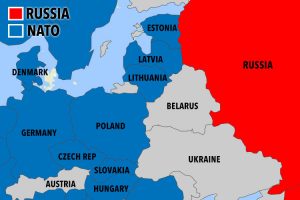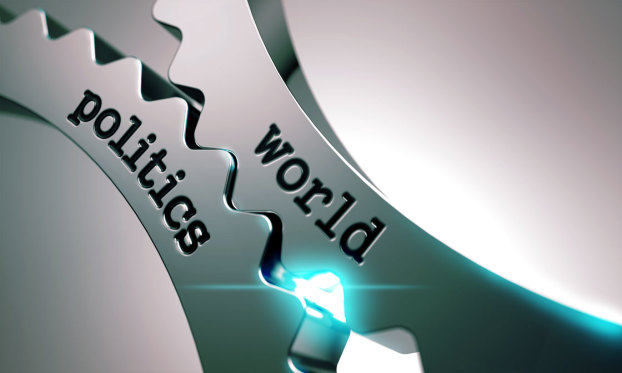The Collapse of the Soviet Union in December 1991 was a major event in world politics. The Communist empire disintegrated leaving the United States of America as the sole superpower of the world. The 1990s were considered to be the era of American hegemony. Under such circumstances, the newly independent Russia was in a setback and was not able to exercise its influence far away from its border. Economic turmoil and separatist movements put Russia in a difficult situation. Nowadays, many experts are debating about the resurgence of Russia on the international stage, and what it means for the rest of the world. So what does Russia want in world politics? There are a number of possible answers to it depending on which angels we are looking at.
Let’s start with its relationship with the West in the face of NATO’s expansion into Eastern Europe.Russia wants to be accepted as an equal partner. It also wants to have a say in any affairs in Europe. Skepticism among Western leaders toward Moscow is still strong; therefore, the quest to be recognized as an equal partner is far-fetched. Democracy and human rights are fundamental to Western European countries. However, Russia does not want such things to be on the agenda when it comes to foreign policy. It believes that the West should not interfere in its domestic affairs since there are different “versions” of democracy.

NATO has steadily expanded into Russia’s backyard. The Baltics states, which were part of Soviet Union, joined the bloc in 2004 much to the dismay of Moscow’s leadership. Other ex-communist countries such as Bulgaria, Romania, Poland, Czech Republic, and Hungary also joined NATO. This expansion represents a serious threat to Russia because it means a loss of influence and buffer zone. We must look at history to understand how important this buffer zone is to Russia. Napoleon and Hitler had both tried to conquer the country, yet the Russians skillfully used their geography to their advantage by exhausting the enemies before they get to Moscow. Each time a hostile force invades Russia each time it is defeated by the vast territory and brutal winter. Russia today does not hold this buffer zone anymore. Moscow’s leadership understands that in any events of war NATO military force will be able to penetrate deeply into the motherland since geographical barriers no longer exist. This paranoia is shown with the current strain relationship with Western powers. The latest attempt by the West to draw Ukraine away from Russia resulted in the annexation of the Crimean peninsula and civil war in the Eastern part of Ukraine. It is simply unacceptable for Russia to see NATO troops at its border. This is a matter of national security, and Russia has continued to do whatever it can to roll back this expansion into its perceived sphere of influence.
The 1990s were the years of humiliation and turmoil. Its leader of the time Boris Yeltsin was a drunker and an incapable leader in handling the country. However, Russia under Vladimir Putin wants to regain its place in the world. It wants to be a major power again and be treated equally on a par with the United States. It is not surprising that the Syrian civil war which started in 2011 is a golden opportunity for Russian leadership to finally have a say in the affairs of the Arab world. The US Air Force has to coordinate its flight route with Russia in Syria to avoid unintentional accidents. With Russian military advisers on the ground with Syrian government forces, it is unlikely for them to be struck by the Coalition planes since major escalation with Russia is the last thing the West wants to see in the Middle East. By forcing its rivals into working with it, Russia has been given attention again. This time in order to determine the future of Syria, Russia is an indispensable player. This is the projection of power and influence which Moscow has been aiming for. The Astana talks between Turkey, Iran, and Russia to find solutions for the Syrian war is still ongoing without the presence of the United States. The absence of its rival automatically increases the Russian influence.
Read what drives North Korea’s nuclear ambition
As a permanent member of the United Nations, Russia has veto power to reject any resolutions by the Security Council. Therefore, it has turned this power to its advantage. In major world issues such as terrorism, North Korean nuclear ambition, climate change, cybersecurity, and piracy, a compromise with Russia is needed. This situation has given Russia the recognition by other countries as a major power that cannot be ignored and pushed aside.From realpolitik perspective, army gives power to the state. A country with a strong military force is able to assert its influence on others. Russia has been investing resources into modernization of its armed forces. Most of its military equipment and facilities are the legacy of Soviet Union. Moscow wants to close this gap
From realpolitik perspective, army gives power to the state. A country with a strong military force is able to assert its influence on others. Russia has been investing resources into modernization of its armed forces. Most of its military equipment and facilities are the legacy of Soviet Union. Moscow wants to close this gap of military capability with its rivals if it is to maintain power and influence. Interestingly, Syrian civil war provides a demonstration of Russian military hardware to potential buyers and a testing ground for new weapons. This has been quite successful for its defense industry that a number of countries especially those in the Middle East are turning to Russia for weapon supply. In addition, the expansion of its naval base on Syrian coast in the Mediterranean is a clear signal that Russia is trying to spread its influence in the region and beyond away from its border.
Read is the world going to face devastating Third World War?
Russia is on its quest to regain its former glory. Fueled by the necessity to roll back NATO expansion into its sphere of influence, this country has come into tension with the West. It has also sought for alternatives to assert its role in international affairs. Syrian civil war is an example of how Russia is using it to regain its role as an important player. We can safely say that the election of Donald Trump in the United States has given the Kremlin hope for better relations. At the same time, Trump’s neo-isolationist rhetoric throughout the campaign has the possibility of giving Russia exactly the space it wants in world politics to further increase its influence where the US has shied away. Will Russia be ultimately successful in this endeavor? It remains to be seen.
writer
Puthyraksmey Yama
Student at Marmara University, Istanbul, Turkey
Department of Political Science and International Relation
